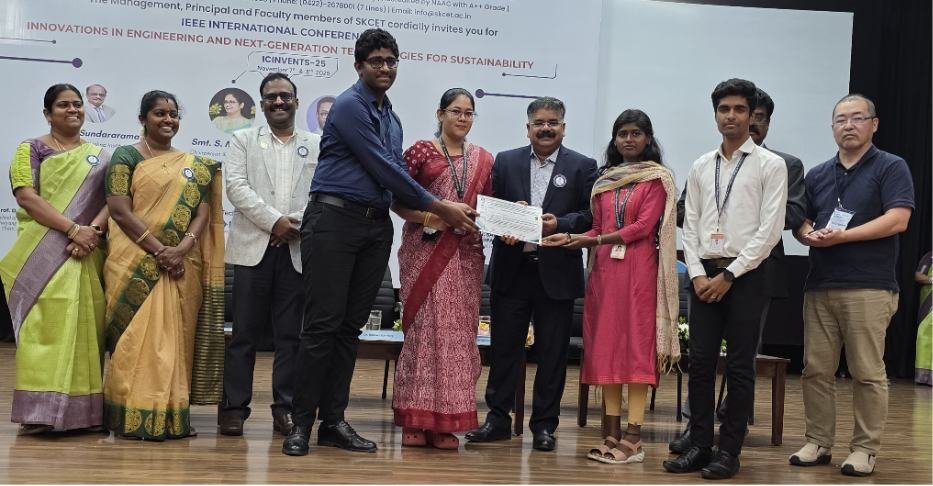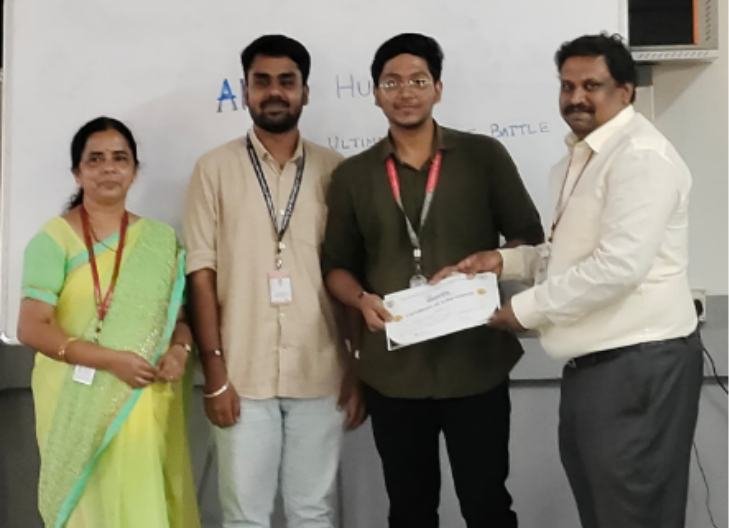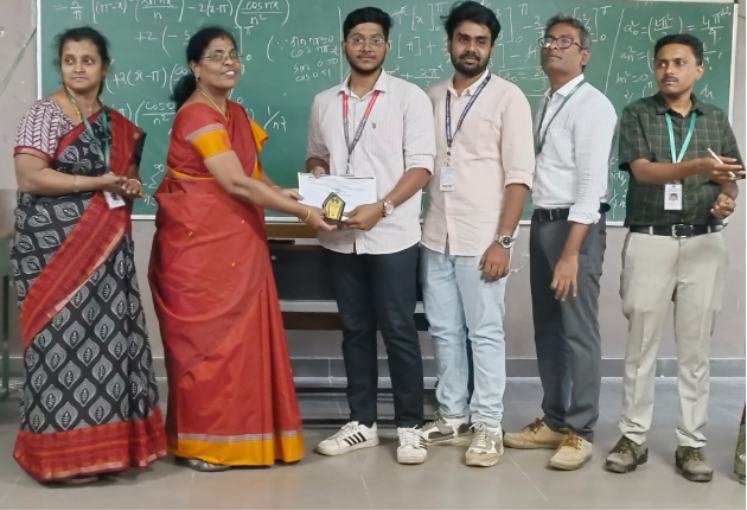Computer Science and Design
About
The Computer Science and Design Department at Sri Krishna College of Engineering and Technology (SKCET) proudly offers a curriculum and syllabi meticulously crafted to meet industry demands, ensuring students are thoroughly prepared for professional success. This innovative program integrates practical sessions with theoretical concepts, enhancing students’ knowledge and skills. By blending computer science principles with design thinking, the department aims to produce versatile graduates who are adept at tackling real-world challenges with creative and technical expertise.
Vision
To build ethical Computer Design professionals with enriched interactive design skills and lifelong quality to cater the dynamic needs of the real-world problems through innovative design solutions.
Mission
To accomplish our vision, we are committed to:
- Develop innovative, proficient and ethically strong computer design engineers with design skills, high caliber and quality to meet Universal challenges.
- Identify current socio, economic problems of national and international significance and provide solutions through competency centers.
- Nurture consultancy, applied research activities and constant upgradation of engineering skills to cater the needs of the corporate and society.
Department Highlights
- Skill Development: Our curriculum blends technical skills in computer science with creative design thinking, preparing students for diverse roles in industries like gaming, animation, virtual/augmented reality, and user interface design.
- Industry Focus: We keep our education relevant by focusing on the latest industry trends and technologies, ensuring our students are well-prepared for jobs in digital design & media industries as well as traditional computer science fields.
- Hands-On Learning: Students gain practical experience through internships, industry projects, and collaborations, helping them build connections and explore career options in digital design & media or pursue academic research in Computer Science or Design.
- Personalized Support: Our faculty and advisors offer individualized guidance to help students navigate their academic journey, pursue their interests, and achieve their goals.
- Career Development: We provide a range of career development resources, including workshops and networking events, to help students secure internships and full-time jobs in digital design & media industries or continue their education in Computer Science or Design.
- Continuous Improvement: We are dedicated to continually refining our program based on student feedback, industry trends, and technological advancements, ensuring our graduates are well-prepared for success in a rapidly evolving professional landscape.
Faculty Details
| S.No | Name | Current Designation |
|---|---|---|
| 1 | Ms.T.Nithya | PoP |
| 2 | Mr.Ajin Roch | Associate Professor |
| 3 | Ms.M.Sanmugapriya | Assistant Professor |
| 4 | Ms.I.Faiza | Assistant Professor |
| 5 | Mr.S.Rehan Krishnan | Assistant Professor |
| 6 | Ms.T.Dureen V Rayen | Assistant Professor |
| 7 | Mr.V.Saran | Assistant professor |
| 8 | Mrs. M.Prabha | Assistant Professor |
| 9 | Mr.R.Sudharson | APoP |

Mr. Mohanapriyan A, Mr. Vijaya Anandhan P, and Ms. Vikasita M (IV CSD) received the Best Conference Paper Award at the IEEE International Conference (ICINVENTS-25), conducted at Sri Krishna College of Engineering and Technology on 7th and 8th November 2025.

Mr. Abhisheck P O and Mr. Anand P (IV CSD) secured a cash award of ₹2,000 at Yukthaha, organized by PSG Institute of Technology and Applied Research on 15th March 2025.

Mr. Abhisheck P O and Mr. Anand P (IV CSD) secured a cash award of ₹1,500 at AIQUBIT, organized by Karpagam Academy of Higher Education on 13th February 2025.
Programme Outcomes
Graduates will be able to:
- PO-1
Engineering knowledge: Apply the knowledge of mathematics, science, engineering fundamentals, and an engineering specialization to the solution of complex engineering problems. - PO-2
Problem analysis: Identify, formulate, review research literature, and analyze complex engineering problems reaching substantiated conclusions using first principles of mathematics, natural sciences, and engineering sciences. - PO-3
Design/development of solutions: Design solutions for complex engineering problems and design system components or processes that meet the specified needs with appropriate consideration for the public health and safety, and the cultural, societal, and environmental considerations. - PO-4
Conduct investigations of complex problems: Use research-based knowledge and research methods including design of experiments, analysis and interpretation of data, and synthesis of the information to provide valid conclusions. - PO-5
Modern tool usage: Create, select, and apply appropriate techniques, resources, and modern engineering and IT tools including prediction and modeling to complex engineering activities with an understanding of the limitations. - PO-6
The engineer and society: Apply reasoning informed by the contextual knowledge to assess societal, health, safety, legal and cultural issues and the consequent responsibilities relevant to the professional engineering practice. - PO-7
Environment and sustainability: Understand the impact of the professional engineering solutions in societal and environmental contexts, and demonstrate the knowledge of, and need for sustainable development. - PO-8
Ethics: Apply ethical principles and commit to professional ethics and responsibilities and norms of the engineering practice. - PO-9
Individual and team work: Function effectively as an individual, and as a member or leader in diverse teams, and in multidisciplinary settings. - PO-10
Communication: Communicate effectively on complex engineering activities with the engineering community and with society at large, such as, being able to comprehend and write effective reports and design documentation, make effective presentations, and give and receive clear instructions. - PO-11
Project management and finance: Demonstrate knowledge and understanding of the engineering and management principles and apply these to one’s own work, as a member and leader in a team, to manage projects and in multidisciplinary environments. - PO-12
Life-long learning: Recognize the need for, and have the preparation and ability to engage in independent and life-long learning in the broadest context of technological change.
Programme Educational Objectives
- PEO 1 : Design, develop and verify effective interactive computer-based solutions to real-life problems.
- PEO 2 : Exhibit soft skills, ethical code of conduct and ability for life-long learning.
Programme Specific Objectives
- PSO 1 : Acquire practical competency with emerging technologies and conduct investigations in computer science and design for continuous growth.
- PSO 2 : Design and develop user interactive systems using engineering skills, design knowledge, programming languages and tools.
- PSO 3 : Communicate effectively, adopt ethics and engage in life-long learning.
Computer Science and Design
About
The Computer Science and Design Department at Sri Krishna College of Engineering and Technology (SKCET) proudly offers a curriculum and syllabi meticulously crafted to meet industry demands, ensuring students are thoroughly prepared for professional success. This innovative program integrates practical sessions with theoretical concepts, enhancing students’ knowledge and skills. By blending computer science principles with design thinking, the department aims to produce versatile graduates who are adept at tackling real-world challenges with creative and technical expertise.
Vision
To build ethical Computer Design professionals with enriched interactive design skills and lifelong quality to cater the dynamic needs of the real-world problems through innovative design solutions.
Mission
To accomplish our vision, we are committed to:
- Develop innovative, proficient and ethically strong computer design engineers with design skills, high caliber and quality to meet Universal challenges.
- Identify current socio, economic problems of national and international significance and provide solutions through competency centers.
- Nurture consultancy, applied research activities and constant upgradation of engineering skills to cater the needs of the corporate and society.
Department Highlights
- Skill Development: Our curriculum blends technical skills in computer science with creative design thinking, preparing students for diverse roles in industries like gaming, animation, virtual/augmented reality, and user interface design.
- Industry Focus: We keep our education relevant by focusing on the latest industry trends and technologies, ensuring our students are well-prepared for jobs in digital design & media industries as well as traditional computer science fields.
- Hands-On Learning: Students gain practical experience through internships, industry projects, and collaborations, helping them build connections and explore career options in digital design & media or pursue academic research in Computer Science or Design.
- Personalized Support: Our faculty and advisors offer individualized guidance to help students navigate their academic journey, pursue their interests, and achieve their goals.
- Career Development: We provide a range of career development resources, including workshops and networking events, to help students secure internships and full-time jobs in digital design & media industries or continue their education in Computer Science or Design.
- Continuous Improvement: We are dedicated to continually refining our program based on student feedback, industry trends, and technological advancements, ensuring our graduates are well-prepared for success in a rapidly evolving professional landscape.
Faculty Details
| S.No | Name | Current Designation |
|---|---|---|
| 1 | Ms.T.Nithya | PoP |
| 2 | Mr.Ajin Roch | Associate Professor |
| 3 | Ms.M.Sanmugapriya | Assistant Professor |
| 4 | Ms.I.Faiza | Assistant Professor |
| 5 | Mr.S.Rehan Krishnan | Assistant Professor |
| 6 | Ms.T.Dureen V Rayen | Assistant Professor |
| 7 | Mr.V.Saran | Assistant professor |
| 8 | Mrs. M.Prabha | Assistant Professor |
| 9 | Mr.R.Sudharson | APoP |

Mr. Mohanapriyan A, Mr. Vijaya Anandhan P, and Ms. Vikasita M (IV CSD) received the Best Conference Paper Award at the IEEE International Conference (ICINVENTS-25), conducted at Sri Krishna College of Engineering and Technology on 7th and 8th November 2025.

Mr. Abhisheck P O and Mr. Anand P (IV CSD) secured a cash award of ₹2,000 at Yukthaha, organized by PSG Institute of Technology and Applied Research on 15th March 2025.

Mr. Abhisheck P O and Mr. Anand P (IV CSD) secured a cash award of ₹1,500 at AIQUBIT, organized by Karpagam Academy of Higher Education on 13th February 2025.
Programme Outcomes
Graduates will be able to:
- PO-1
Engineering knowledge: Apply the knowledge of mathematics, science, engineering fundamentals, and an engineering specialization to the solution of complex engineering problems. - PO-2
Problem analysis: Identify, formulate, review research literature, and analyze complex engineering problems reaching substantiated conclusions using first principles of mathematics, natural sciences, and engineering sciences. - PO-3
Design/development of solutions: Design solutions for complex engineering problems and design system components or processes that meet the specified needs with appropriate consideration for the public health and safety, and the cultural, societal, and environmental considerations. - PO-4
Conduct investigations of complex problems: Use research-based knowledge and research methods including design of experiments, analysis and interpretation of data, and synthesis of the information to provide valid conclusions. - PO-5
Modern tool usage: Create, select, and apply appropriate techniques, resources, and modern engineering and IT tools including prediction and modeling to complex engineering activities with an understanding of the limitations. - PO-6
The engineer and society: Apply reasoning informed by the contextual knowledge to assess societal, health, safety, legal and cultural issues and the consequent responsibilities relevant to the professional engineering practice. - PO-7
Environment and sustainability: Understand the impact of the professional engineering solutions in societal and environmental contexts, and demonstrate the knowledge of, and need for sustainable development. - PO-8
Ethics: Apply ethical principles and commit to professional ethics and responsibilities and norms of the engineering practice. - PO-9
Individual and team work: Function effectively as an individual, and as a member or leader in diverse teams, and in multidisciplinary settings. - PO-10
Communication: Communicate effectively on complex engineering activities with the engineering community and with society at large, such as, being able to comprehend and write effective reports and design documentation, make effective presentations, and give and receive clear instructions. - PO-11
Project management and finance: Demonstrate knowledge and understanding of the engineering and management principles and apply these to one’s own work, as a member and leader in a team, to manage projects and in multidisciplinary environments. - PO-12
Life-long learning: Recognize the need for, and have the preparation and ability to engage in independent and life-long learning in the broadest context of technological change.
Programme Educational Objectives
- PEO 1 : Design, develop and verify effective interactive computer-based solutions to real-life problems.
- PEO 2 : Exhibit soft skills, ethical code of conduct and ability for life-long learning.
Programme Specific Objectives
- PSO 1 : Acquire practical competency with emerging technologies and conduct investigations in computer science and design for continuous growth.
- PSO 2 : Design and develop user interactive systems using engineering skills, design knowledge, programming languages and tools.
- PSO 3 : Communicate effectively, adopt ethics and engage in life-long learning.


